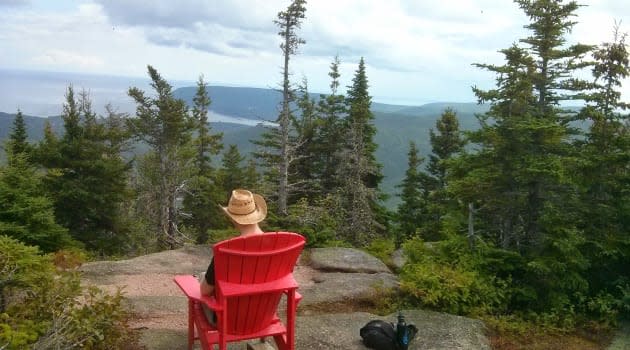FIRE: How One Couple Retired in Their 30s Through Real Estate Investing

Six years ago, Leif and Lina Kristjansen were self-described regular people. "We had... 'normal-people jobs,'" said Leif, a lab scientist, and whose wife, Lina, worked as a librarian. That changed one day, when Leif asked to take three weeks off for vacation.
He could have his time off, his employer said, but he needed to make up the lost time before his vacation. "The amount I had to work before I got to take any time off—I was just dead,” Leif said. “It took me about a week to recover from it." While this type of request isn’t out of the ordinary, it was enough to make the Kristjansens realize there might be a better way to live. "I remember thinking how dumb it was to have to work so much just to be able to go somewhere,” said Leif. “I wanted to figure out how to not live a life like this." And so began the Kristjansens' journey toward embracing the FIRE movement.

Leif on vacation
FIRE (financial independence, retire early) enthusiasts are proponents of exiting the 9-to-5 rat race and living life on their own terms. Some FIRE-ees manage this by living on a restricted budget and saving enough to last the rest of their lives. Others create side-streams of income, such as monetizing a blog, so they can work from home.
For Leif and Lina, the path to FIRE was through real estate. We spoke with Leif about how he and Lina reached their financial goals in five years.
How to retire in your 30s
“The better you are at not spending, the better your chances of success," said Leif of his mantra for saving money. But while saving and smart investments are two cornerstones of the FIRE movement, Leif wasn't interested in stockpiling large sums of cash in index funds and skimming off the interest each year—a favored tactic within the FIRE community. Instead, he wanted something that generated money and was an antidote against the volatility of the stock market.
The answer was real estate, something the Kristjansens had already started dabbling in through a rental home they had purchased prior to joining the FIRE movement. "I decided I liked it [as a form of investment],” said Leif. “So that's where most of my effort went—into rentals." Unlike stocks, where the value can go up and down, rental properties can produce consistent cash returns on a monthly basis, making them one of the best tools for early retirement, according to Leif. The couple did keep some money invested in index funds, but they spent the next several years trimming their expenses and diverting their savings into new rental properties.
One of the biggest expenses they had to confront was the amount they spent on dinner and drinks. "We used to go out a lot," Leif said, "but now we have people in." He estimates they spent about $300 a week going out before they bought their first home. Now they spend about $150 on groceries and liquor combined each week, and they’ve taken to inviting friends over more often. "The parties are better,” said Leif, “and if you cook you can do it with your friends, which can be loads of fun." The couple also limits themselves to one modest vehicle to cut down on insurance and transportation expenses. Leif estimates that during their saving phase, they put away about 55% of their income for property investments.
Over the course of five years, the Kristjansens acquired seven rental units (not including one property they recently sold or the house they currently live in). Their rental portfolio consists of one high-end home that earns a gross income of $3,400 monthly, one duplex housing two separate units and four modest single-family homes. They purchased the properties using mortgages—one of the most valuable components of real-estate investing, according to Leif—to leverage their money, so they could build their portfolio of rental properties faster than they could if they were using their cash on its own.
"You can make a ton of money," Leif said. "But the downside to [rental investing] is that it's definitely more work. Tenants, sometimes they'll break windows or something like that. As long as you can stomach that, then it's good."
The home-buying process is also more complex. "Buying a house is complicated because you need to get banks involved,” said Leif, “whereas, if you're just buying an index fund, you just hit a button and you're done.” But despite the additional work, the Kristjansens have enjoyed the payoff.
The couple was able to rent out their properties for more than the cost of their mortgage payments, property tax and homeowners insurance premiums, so they made a profit each month. They also hired a management company so that income became completely passive.
Money in & out
Here's how much the Kristjansens earn and spend every month
Purpose | Total | Notes | |
|---|---|---|---|
Approx. $5,000 | |||
Mortgage | $1,250 | Principal and interest | |
Other housing expenses | $740 |
| |
Daycare | $1,000 | This is a huge expense that we could cut it if we wanted to, but we still send one kid to daycare just to keep our days relaxed. | |
Living and entertainment | $1,700 | Food, gas, clothing, baby items, phones, internet and gym, as well as Amazon purchases, massages and going out occasionally. Notably, I probably spend at least $200 on liquor for the house each month because we have people over a lot. | |
Travel | $300 | This is an estimate since costs are all over the map, but we travel often. | |
Approx. $7,000 | |||
Rental income | $3,000 | This is extra cash from houses, which will turn into $5,000 a month once I have paid off some mortgages. I don't factor in appreciation because I can't access that money easily. | |
Stocks | $500 | Stocks are hard to track, but I get about $500 a month from them. | |
Private loans | $550 | These are personal loans I gave out. | |
Part-time work | $3,000 | ||
Approx. $2,000 | Not counting stock and real estate appreciation | ||
Still, Leif didn't retire right away—not because he couldn't afford to, but because it's such an intimidating step to take. "I hit FIRE after aiming to achieve it for about 5 years,” he said. “I didn't pull the trigger for about a year after that because it was scary.” Leif continued to work until he was 32, whereas Lina couldn’t wait to retire and did so two years earlier at age 31.
What are they doing now?
Today Lina runs an Etsy shop where she sells baby products. Leif is building a blog, Five Year FIRE Escape, to help others achieve financial independence. But he still works in his old job a few days a week. "Being 100% retired from the age of 32 sounds pretty boring," he said, "and work is a lot better when you don't have to go most days and you don't really have to do anything you don't want to do."

Lina and their baby enjoying early retirement
With steady income coming in every month, the couple is saving for their children's college tuition and for unexpected expenses. They also plan to use some income to buy additional rental properties. "It's almost like an addiction," Leif said. "It's fun if you see a good deal. So when I have excess money I'll just buy more as well." They're thinking about charitable causes, too. "Hopefully in the future, I'll be really inspired by some sort of amazing cause and I'll give money to it," he said. He hasn't found his cause yet, but he's keeping it in mind.
But it's not all savings and investments—the couple wants to celebrate their new life, too. Currently, they're planning a well-earned and lengthy vacation. "We're planning to spend like 4 months in Copenhagen," Leif said.
Why Some People Never Reach FIRE
We asked Leif why he thought some people fail to ever reach financial independence and early retirement. "Oh, the sacrifices," he said. "I didn't buy a fancy car. I didn't buy a fancy house. And we stopped going out. A lot of people aren't willing to make those sacrifices."
Leif’s tips for those hoping to follow in his footsteps? "Figure out something you'd want to do part-time forever—without factoring in your current job. You can create an amazing job if you only need to work a little bit, so find something that you can enjoy doing for the rest of your life." Not only can finding this part-time work reduce the number of sacrifices you'll have to make to become financially independent, but it will also provide meaning and structure to your days when all your friends are at their jobs.
"And second," he said, "figure out how to save more. If you don't save your money, you'll never get anywhere."
